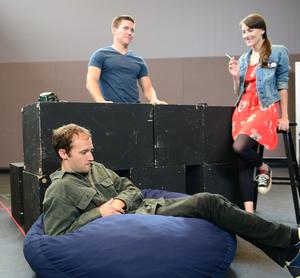Theater Review: A Superb Staging of “This Is Our Youth” — A Perceptive Vision of American Muddle
In this brilliantly written play, Kenneth Lonergan finds both the humor and angst in the moral muddle generated by the Reagan Revolution.
This Is Our Youth by Kenneth Lonergan. Directed by Lewis D. Wheeler. At the Gloucester Stage Company, Gloucester, MA, through August 25.
By Tim Jackson
Anyone who has viewed You Can Count On Me, or who had a chance to see the rarely screened Margaret, knows that Kenneth Lonergan is among our best storytellers, a master at penning contemporary dialogue. Under the direction of Lewis D. Wheeler, the Gloucester Stage Company is mounting an excellent production of Lonergan’s This Is Our Youth. While his films were two of the best of the last decade, this early play from 1996 draws on his dramatist’s gift for revealing, through brilliant exchanges and seemingly rambling monologues, the bedeviling confusion and inarticulacy of men and women coming into adulthood in a morally confused world. There’s both a gracelessness and poetry in the words of his characters, who are guided by misguided rationales and bad decisions.
Dennis Ziegler and Warren Straub are spoiled, middle-class young men living in Manhattan during the Reagan Era, dealing cocaine with impunity and maintaining questionable relationships. They are both from families that have not provided a sturdy ethical foundation for navigating the adult world. Their blatant bad behavior, cluelessness, and abrasiveness are conveyed through perceptive dialogue that suggests the anguish of lost souls underneath labored bravado and painful self-doubt. Dennis is the bullying best friend of Warren, a morose and anxious loser who has been kicked out of his father’s house and is looking for a place to crash. He made off with $15,000 of his father’s money that he found stashed in a suitcase in his dad’s office. His only meaningful possession is a cache of vintage toys he carries around in a suitcase.
Dennis, an enterprising and habitual drug dealer full of piss and vinegar, persuades Warren to use the cash for a coke deal that will net each some extra cash. It will also mean that the stolen money can be returned before Warren’s caught. When Dennis heads off to seal the deal, Jessica Goldman, a sober-minded but insecure fashion student, shows up. After a painfully awkward exchange, Warren agrees to use some of the cash to buy them a night at the Plaza where the desperate Warren can finally get laid. Or maybe he believes he’s in love. It is certain that each of these sad and uncertain misfits desires affection. The first question out of Dennis’s mouth when the heavy-hearted Warren returns is “Did you get laid?” That one moment leads to sad and anguished consequences.
To make Lonergan’s distinctively poetic and colloquial dialogue work, you need strong and confident actors. These parts have been played in past productions by the likes of Mark Ruffalo, Jake Gyllenhaal, Casey Affleck, Kieran Culkin, Freddie Prinze Jr., and Anna Paquin. The actors in the GSP production are up to the task: they handle the dizzying acrobatics of Lonergan’s monologues with agile aplomb. Jimi Stanton as Dennis is horribly abrasive at first, with melancholy moments of insecurity poking through, until eventually his sad uncertainties are revealed. His long monologues ramble on hysterically, the convincing result of a coke-addled imagination that soon comes crashing down. As Warren, Alex Pollock physically lurches back and forth, pivoting on one foot and then the other as though uncertain about how he can position himself, which way to walk or to look in the world. It’s a compelling portrait of a damaged person who is being driven to despair. His certainties have been sold out from under him, but he resolves to survive. Amanda Collins is flawless, protecting her insecurity (and her inarticulate yearnings) with an intellect that is only beginning to find the answers.
The script’s political context explores the fruits of the post me-decade, Reagan Revolution era: unbridled greed and moral drift. The age of free market capitalism and monomaniacal optimism gave birth to a decade where middle-class use of coke and crack was rampant. In this brilliantly written play, Lonergan finds both the humor and angst in the muddle. Warren’s suitcase of vintage toys from his youth, kitschy objects that mean so much to him are, like Amanda’s glass menagerie, symbols of things he has to lose in order to mature, for him to accept the inevitability of loss. His plight invites us to take stock of our own follies and decisions.
It’s a tricky title: This Is Our Youth. By emphasizing “This,” does Lonergan indict a generation? Or, by emphasizing “Our,” does he ask that we find in these alienated characters something we all share? This wonderful production suggests that the answer remains somewhere in the middle, an artist’s open-ended response to American contradictions.

